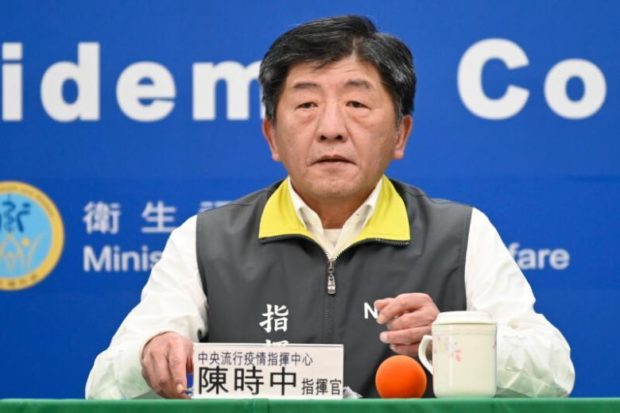
Taiwan’s Health and Welfare Minister Chen Shih-chung. FILE PHOTO / AFP
MANILA, Philippines — In a bid to help the international community fight COVID-19, Taiwan shared parts of the game plan it used to return and maintain normalcy within the country: institute effective health measures first, then you shield the economy.
In an article from Taiwan Minister of Health and Welfare Dr. Chen Shih-chung shared by the Taipei Economic and Cultural Office (TECO) in the Philippines on Monday, Taiwan hoped that their formula can help countries understand the pandemic better, especially those struggling in containing infections.
According to Chen, their experience in dealing with the 2003 Severe Acute Respiratory Syndrome (SARS) — in many ways considered as the precursor to COVID-19 — was a big help. However, they still instituted measures to minimize cases, like linking hospitals across the country.
“After dealing with SARS, Taiwan established a nationwide infectious disease healthcare network that is led and overseen by infectious disease experts across six regions. More than 100 secondary response hospitals are included in the network and all twenty-two special municipalities, counties and cities have designated their primary response hospitals,” Chen said.
One particular benefit of that network was that hospitals would not be overwhelmed, which also means that non-COVID-19 cases can also be addressed.
This system, Taiwan said, has resulted in zero deaths among infected health workers — despite being very near to China, the source of the latest coronavirus strain that causes COVID-19.
“This has proven instrumental in protecting health systems and health professionals from being overwhelmed, and allowed most non-COVID-19 health services to continue to operate without disruption during the pandemic,” Chen explained.
“To date, there have been only two hospital-associated COVID-19 outbreaks in Taiwan. Both were well managed resulting a total of 11 cases and zero death of health professionals,” he added.
These measures gave Taiwan the chance to avoid economic problems unlike most of the world which was beset with the contraction of their gross domestic product.
Also, Chen stressed that they did all of these while trying to maintain the balance between enforcing health protocols and respecting people’s privacy and freedom — and not committing any human rights abuses.
“By introducing public health control measures early and effectively, Taiwan has also mitigated the economic impact of COVID-19 […] In stark contrast with the global economic contraction, Taiwan’s GDP growth for 2020 was approximately 3.11 percent, with even higher growth of 4.94 percent in the fourth quarter,” Chen noted.
“Throughout this pandemic, Taiwan has demonstrated an emphasis on the right to health and associated protections and strong opposition to human rights abuses. Indeed, at no point has Taiwan restricted people’s right to free expression, assembly, or participation in public life,” he added.
Since COVID-19 emerged from China’s Wuhan City, Taiwan and other countries like New Zealand have been hailed as models for the pandemic response. Australian think-tank Lowy Institute ranked Taiwan third out of 98 countries, in terms of their COVID Performance Index.
In contrast, the Philippines was ranked 79th.
READ: New Zealand, Taiwan top COVID performance ranking; US, UK languish
READ: PH ranks 79th in COVID-19 response among 98 countries — Aussie think tank
Taiwan has been used as a concrete example of Vice President Leni Robredo’s call back in 2020, for the government to solve the COVID-19 pandemic without vaccines. According to Robredo, Taiwan and other countries believed on their data, and used it to solve the pandemic’s problems.
READ: Robredo cites data showing countries beating COVID-19 while awaiting vaccine
Chen said that they while they would continue to help other countries, Taiwan believes that they could help more if they are included in discussions within international circles, especially the World Health Organization (WHO).
Currently, Taiwan is not a part of the WHO due to its one-China policy.
“We urge WHO and related parties to acknowledge Taiwan’s longstanding contributions to the international community in the areas of public health, disease prevention, and the human right to health, and to include Taiwan in WHO and its meetings, mechanisms, and activities,” he said.
“Taiwan will continue to work with the rest of the world to ensure that all enjoy the fundamental human right to health as stipulated in the WHO Constitution. Echoing the mantra of the United Nations’ 2030 Sustainable Development Goals, no one should be left behind,” he added.